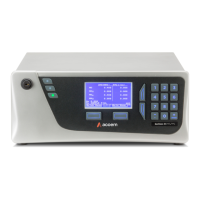At times it may be desirable to manually adjust the instrument’s gain and offsets. Typically this
option is only used when an instrument calibration has been corrupted and the user wishes to reset
the instrument response factors prior to performing a new calibration.
To manually adjust the instrument follow the below procedure:
1. Open - Main Menu Service Menu Calculation Factors Menu.
2. Edit - Instrument Gain - (Adjust as required. 1 is the default) - Accept.
3. Edit - Zero Offset NO - (Adjust as required. 0 is the default) - Accept.
4. Edit - Zero Offset NO2 - (Adjust as required. 0 is the default) - Accept.
5. Edit - Zero Offset NH3 - (Adjust as required. 0 is the default) - Accept.
5.5 Precision Check
Similar to a normal zero or span calibration, a precision check is a Level 2 calibration that may be
performed using a non-certified reference. The instrument is supplied with a known concentration of
span gas (or zero air) and the instrument’s response observed. However, no adjustment to the
instrument response is made during a precision check.
Note: Ensure that the instrument has been running for at least one hour before any calibration is
performed to ensure the instrument’s stability.
A precision check can be performed either manually via the Sample Port or Calibration Port or can
also be performed automatically using the Timed Mode (refer to Section 3.4.10.2).
Procedure
1. Supply the instrument with a zero source (refer to Section 5.3 for the procedure of setting up a
zero, but do not do a Zero Calibrate (NO) or (NO2) or (NH3)).
2. Observe and record the measurement from the instrument.
3. Supply the instrument with a span source (refer to Section 5.4 for the procedure of setting up a
span but do not do a Span Calibrate NOx).
4. Observe and record the measurement from the instrument.
5. Check both readings against your local applicable standards.
If an instrument fails a span precision check (based on the users local applicable standards), perform
a span calibration (refer to Section 5.4).
If an instrument fails a zero precision check (based on the users local applicable standards), resolve
the issue by referring to Section 6).

